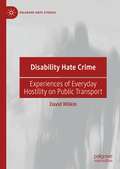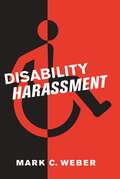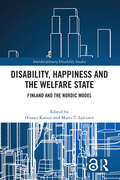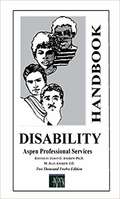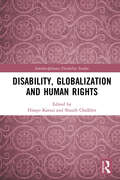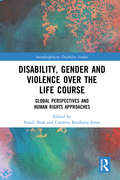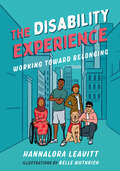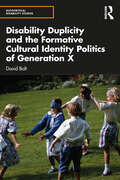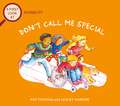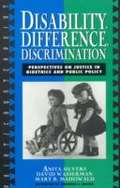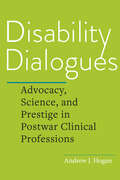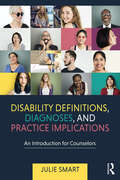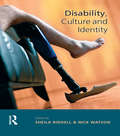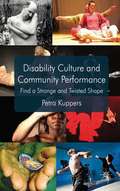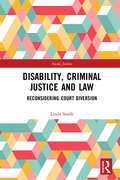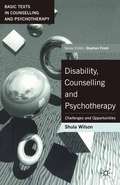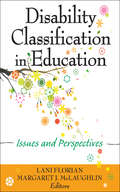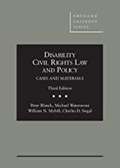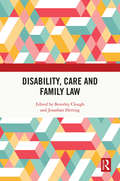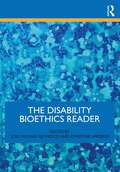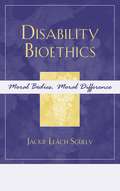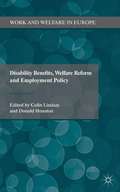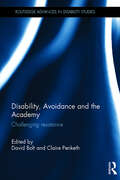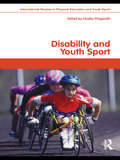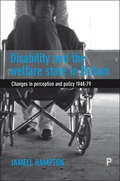- Table View
- List View
Disability Hate Crime: Experiences of Everyday Hostility on Public Transport (Palgrave Hate Studies)
by David WilkinThis book examines the experiences of disabled people on public transport to reveal the everyday abuses that many experience there, and the resilience that they need in order to conduct an ordinary life. This work represents an intertwining of personal journeys, with its author writing from first-hand experience, and now working as one of the leading researchers of disability hate crime (DHC) in the UK. DHC is an under-researched area and the findings in this book have implications beyond the public transport context. This book draws on a sample of 56 victim-participants and includes data drawn from public transport regulators, service operators and staff in the UK. Wilkin argues that established legislation needs to be recognised and implemented by regulatory and local authorities in order to reach equality objectives on public transport. Each chapter is clearly structured, accessibly written and includes key definitions which will speak to practitioners and academics with an interest in victimology, policing, social policy, gender studies, disability studies, migration studies, equality studies and religious studies. This book also examines how effectively authorities and service providers safeguard disabled people on UK public transport and reveals adaptive approaches to researching with disabled people.
Disability Harassment
by Mark C. WeberBuilding on the insights of both disability studies and civil rights scholars, Mark C. Weber frames his examination of disability harassment on the premise that disabled people are members of a minority group that must negotiate an artificial yet often damaging environment of physical and attitudinal barriers. The book considers courts' approaches to the problem of disability harassment, particularly the application of an analogy to race and sex harassment and the development of legal remedies and policy reforms under the Americans with Disabilities Act (ADA). While litigation under the ADA has addressed discrimination in public accommodations, employment, and education, Weber points out that the law has done little to combat disability harassment. He recommends that arguments based on unused provisions of the ADA should be developed and new legal remedies advanced to address the problem. Disability Harassment also draws on case law to explore special problems of harassment in the public schools, and closes with an appeal to judges and lawmakers for expanded legal protection against harassment.
Disability, Happiness and the Welfare State: Finland and the Nordic Model (Interdisciplinary Disability Studies)
by Hisayo Katsui Matti T. LaitinenThis book looks at disability as an evolving social phenomenon. Disability is created through the interaction between persons with impairments and their environment.Exploring these experiences of persons with disabilities and discussing universality and particularity in our understanding of assumed development and normalcy, it takes Finland, which has been chosen repeatedly as the happiest country in the world as its case- study. Using disability as a critical lens helps to demystify Finland that has the positive reputation of a Welfare State. By identifying different kinds of discrimination against persons with disabilities as well as successful examples of disability inclusion, it shows that when looking Finland from the perspective of persons with disabilities, inequality and poverty have been collective experiences of too many of them.It will be of interest to all scholars and students of disability studies, sociology, social policy, social work, political science, health and well-being studies and Nordic studies more broadly.The Open Access version of this book, available at http://www.taylorfrancis.com, has been made available under a Creative Commons [Attribution-Non Commercial-No Derivatives (CC-BY-NC-ND)] 4.0 license.
Disability, Globalization and Human Rights (Interdisciplinary Disability Studies)
by Hisayo KatsuiThe UN Convention on the Rights of Persons with Disabilities has facilitated the understanding that disability is both a human rights and development issue. In order to achieve the Sustainable Development Goals by 2030, the focus on disability inclusion has become increasingly important in the discourse of international and national efforts for "leaving no one behind", the motto of the SDGs. This book discusses pertinent and emerging themes such as disability rights, globalization, inequalities, international cooperation and representation. Evidence which has been obtained tends to show that persons with disabilities have been disproportionately left behind without proper representation, participation and inclusion. This book critically investigates the gaps at different levels, from top to bottom, and as importantly, within the global disability movement, for the realization of global disability rights, and theorizes the intersection of disability, globalization and human rights. Empirical case studies from different countries and contexts are introduced to deepen analysis on theories of critical disability studies from a global perspective. Co-edited by a disability researcher and the former United Nations Special Rapporteur on Disability, this book will be of interest to all students, academics, policy makers and practitioners working to advance the cause of disability rights around the world.
Disability, Gender and Violence over the Life Course: Global Perspectives and Human Rights Approaches (Interdisciplinary Disability Studies)
by Sonali Shah Caroline Bradbury-JonesThis is the first book to explore the interplay of disability, gender and violence over the life course from researcher, practitioner and survivor perspectives. It gives due weight to the accounts of disabled children and adults who have survived institutional or individual violence, evidencing barriers to recognition, disclosure and reporting. Written by disabled and non-disabled women from around the world, Disability, Gender and Violence over the Life Course addresses the dearth of voices and experiences of disabled women and girls in empirical research, policy and practice on issues of violence, victimisation, protection, support and prevention. Divided into three parts – Childhood, Adulthood and Older Life – this collection offers diverse perspectives on the intersectionality of disability, age, ethnicity, sexuality and violence that have hitherto been absent. This book will be an invaluable resource for students and practitioners of multiple fields of practice and academic studies, including health and social care, nursing, social work, childhood studies, gender studies, disability studies, safeguarding and child protection, equality and human rights, sociology and criminology.
The Disability Experience: Working Toward Belonging (Orca Issues #5)
by Hannalora LeavittPeople with disabilities (PWDs) have the same aspirations for their lives as you do for yours. The difference is that PWDs don’t have the same access to education, employment, housing, transportation and healthcare in order to achieve their goals. In The Disability Experience you’ll meet people with different kinds of disabilities, and you'll begin to understand the ways PWDs have been ignored, reviled and marginalized throughout history. The book also celebrates the triumphs and achievements of PWDs and shares the powerful stories of those who have fought for change.
Disability Duplicity and the Formative Cultural Identity Politics of Generation X (Autocritical Disability Studies)
by David BoltDisability is history and futurity, culture and society, practice and theory, work and play, an immense desire for life by which body and mind are dragged kicking and screaming into each and every new day. Using autocritical discourse analysis, a new hybrid research method that combines aspects of the established methods of critical discourse analysis (CDA) and autoethnography, this book explores the formative cultural identity politics of disability via cultural stations of UK popular culture. These cultural stations include action figures, children’s books, television miniseries, comics, comedy films, teenage drama and sitcoms, the punk rock movement, and alternative comedy. Although the cultural stations range from toys and comics to aggressive music and chaotic sitcoms, all are considered with a focus on the language and tropes of disability. Indeed, most of the works are not remembered as portrayals of disability but the book’s analysis reveals flash if not fleeting representations that, when centralised, clarify patterns of duplicity. Via the language of power, and the power of language, all these texts are found to have contributed to the formative cultural identity politics of disability. It will be of interest to all scholars and students of disability studies, sociology, toy studies, comic studies, humour studies, television studies, popular music studies, gender studies, literary studies, and cultural studies.
Disability: Don't Call Me Special (A First Look At #6)
by Pat ThomasThis updated edition of this 20-year-old bestselling title, with consultants from Mencap, enables parents to help their children explore questons about concerns about disability in a simple and reassuring way. It challenges the stereotypes that are often formed during childhood. Notes for parents and teachers at the back of the book provide valuable advice for how to share this book with your child or class. Written by a trained psychotherapist, journalist and parent, and illustrated by an experienced children's book artist, this title is part of an acclaimed and successful series of picture-book non-fiction for Early Years. Books in the series give advice and promote interaction between children, parents, and teachers on a wide variety of personal, social and emotional issues. They are excellent tools for teachers to use during classroom discussions.
Disability, Difference, Discrimination: Perspectives on Justice in Bioethics and Public Policy
by Anita Silvers Mary Mahowald David WassermanThree philosophers and a physician address the impact of the 1990 Americans with Disabilities Act on what we think, personally and socially, about disability. The essays take differing positions on how justice for people with disabilities may be secured while addressing the ways in which the law has altered philosophical assumptions about people with disabilities. Themes include dependence, independence, and interdependence; normalcy and deviancy; fairness in allocating benefits and burdens; intrinsic or instrumental value; and Kantian concerns for human dignity and utilitarian concerns for aggregate welfare. Annotation c. Book News, Inc. , Portland, OR (booknews. com)
Disability Dialogues: Advocacy, Science, and Prestige in Postwar Clinical Professions
by Andrew J. HoganA historical look at how activists influenced the adoption of more positive, inclusive, and sociopolitical views of disability.Disability activism has fundamentally changed American society for the better—and along with it, the views and practices of many clinical professionals. After 1945, disability self-advocates and family advocates pushed for the inclusion of more positive, inclusive, and sociopolitical perspectives on disability in clinical research, training, and practice. In Disability Dialogues, Andrew J. Hogan highlights the contributions of disabled people—along with their family members and other allies—in changing clinical understandings and approaches to disability.Hogan examines the evolving medical, social, and political engagement of three postwar professions—clinical psychology, pediatrics, and genetic counseling—with disability and disability-related advocacy. Professionals in these fields historically resisted adopting a more inclusive and accepting perspective on people with disabilities primarily due to concerns about professional role, identity, and prestige. In response to the work of disability activists, however, these attitudes gradually began to change. Disability Dialogues provides an important contribution to historical, sociological, and bioethical accounts of disability and clinical professionalization. Moving beyond advocacy alone, Hogan makes the case for why present-day clinical professional fields need to better recruit and support disabled practitioners. Disabled clinicians are uniquely positioned to combine biomedical expertise with their lived experiences of disability and encourage greater tolerance for disabilities among their colleagues, students, and institutions.
Disability Definitions, Diagnoses, and Practice Implications: An Introduction for Counselors
by Julie Smart<p>This introductory text defines and describes disability, while providing concrete practice guidelines and recommendations for students in the fields of counseling, social work, and the helping professions. Various specialty areas are explored in detail, including marriage and family counseling, adolescent counseling, addictions counseling, LGBTQ concerns, multicultural counseling, and career counseling. <p>The first three chapters lay the foundations by discussing the demand for counseling services by individuals with all types of disabilities; presenting clinical, legal, medical/biological, and personal definitions of disability; and describing physical, cognitive, and psychiatric disabilities. Next, author Julie Smart examines core beliefs about disability using a range of first-person accounts from experienced counselors. The last six chapters focus on practice guidelines for various aspects of disability—including ethical considerations, societal issues, social role demands, and individual responses—and consider new possibilities for disability counseling professions. <p>With rich case studies woven throughout, as well as valuable information on client needs, disability categorizations, and key Models of Disability, this essential textbook will be useful not only to counseling students but also to professional counselors, social workers, and psychologists.</p>
Disability, Culture and Identity
by Sheila Riddell Nick WatsonFirst published in 2003. Routledge is an imprint of Taylor & Francis, an informa company.
Disability Culture and Community Performance
by Petra KuppersPerformances in hospices andon beaches; cross-cultural myth making in Wales, New Zealand and the US; communal poetry among mental health system survivors: this book presents a senior practitioner/critic's exploration of arts-based research processes sustained over more than a decade -a subtle engagement with disability culture. "
Disability, Criminal Justice and Law: Reconsidering Court Diversion (Social Justice)
by Linda SteeleThrough theoretical and empirical examination of legal frameworks for court diversion, this book interrogates law’s complicity in the debilitation of disabled people. In a post-deinstitutionalisation era, diverting disabled people from criminal justice systems and into mental health and disability services is considered therapeutic, humane and socially just. Yet, by drawing on Foucauldian theory of biopolitics, critical legal and political theory and critical disability theory, Steele argues that court diversion continues disability oppression. It can facilitate criminalisation, control and punishment of disabled people who are not sentenced and might not even be convicted of any criminal offences. On a broader level, court diversion contributes to the longstanding phenomenon of disability-specific coercive intervention, legitimates prison incarceration and shores up the boundaries of foundational legal concepts at the core of jurisdiction, legal personhood and sovereignty. Steele shows that the United Nations Convention on the Rights of Persons with Disabilities cannot respond to the complexities of court diversion, suggesting the CRPD is of limited use in contesting carceral control and legal and settler colonial violence. The book not only offers new ways to understand relationships between disability, criminal justice and law; it also proposes theoretical and practical strategies that contribute to the development of a wider re-imagining of a more progressive and just socio-legal order. The book will be of interest to scholars and students of disability law, criminal law, medical law, socio-legal studies, disability studies, social work and criminology. It will also be of interest to disability, prisoner and social justice activists.
Disability, Counselling and Psychotherapy: Challenges and Opportunities
by Shula Wilson"What is Disability?" and "Why am I disabled?" asked Joe, the seven year old boy, born with cerebral palsy. . . Although disability is of concern to us all, very little attention has been paid to the felt experience of the disabled person and the ways in which psychotherapy might be constructively utilised. Disability, Counselling and Psychotherapy directly addresses this gap and, taking a life-span perspective and a psychoanalytic approach, actively explores the challenges and opportunities of disability to therapy, the caring professions and society more widely. Shula Wilson introduces a model aimed at achieving autonomy that is based on the significance of the primary mother-baby relationship and the awareness of human mortality. In doing so she offers a new way of relating to disabled people and working through unanswerable questions such as those raised by Joe, above. She also challenges attitudes and reactions to controversial issues such as sex, death and the mystery behind altering body image, and brings to the surface the desires, hopes and frustrations of disabled people living in an environment ridden with fears and prejudices. With its lively case discussion and clear theoretical base, Disability, Counselling and Psychotherapy is a vital resource for all practising professionals and trainees.
Disability Classification in Education: Issues and Perspectives
by Margaret J. McLaughlin Lani FlorianThis edited volume examines current disability classification systems, the dilemmas educators face in categorizing students with special needs, and alternative options based on recent challenges and trends.
Disability Civil Rights Law And Policy, Cases And Materials (American Casebook)
by Peter Blanck Michael Waterstone William N. Myhill Charles D. SiegalThis casebook examines the development of disability rights law and policy in the United States and abroad and can be used as either a law or graduate school teaching tool. It gives a complete and current treatment of the Americans with Disabilities Act and the ADA Amendments Act, including the background of the statute's passage, definition of disability, discrimination in employment, public services, and public accommodations. It also gives in-depth coverage of other important federal disability discrimination statutes like the Individuals with Disabilities Education Act, Rehabilitation Act, and Fair Housing Amendments Act. This book is unique in that it offers extensive coverage of the rapidly developing area of international disability law, through discussion of the new UN Convention on Rights of Persons with Disabilities and related developments. The authors also offer detailed coverage of current policy issues involving taxation, health policy, and technology. The book has been streamlined significantly since the last edition.
Disability, Care and Family Law
by Jonathan Herring Beverley CloughThis book explores the series of issues that emerge at the intersection of disability, care and family law. Disability studies is an area of increasing academic interest. In addition to a subject in its own right, there has been growing concern to ensure that mainstream subjects diversify and include marginalised voices, including those of disabled people. Family law in modern times is often based on an "able-bodied autonomous norm" but can fit less well with the complexities of living with disability. In response, this book addresses a range of important and highly topical issues: whether care proceedings are used too often in cases where parents have disabilities; how the law should respond to children who care for disabled parents – and the care of older family members with disabilities. It also considers the challenges posed by the UN Convention on the Rights of Persons with Disabilities, particularly around the different institutional and state responsibilities captured in the Convention, and around decision-making for both disabled adults and children. This interdisciplinary collection – with contributors from law, criminology, sociology and social policy as well as from policy and activist backgrounds – will appeal to academic family lawyers and disability scholars as well as students interested in issues around family law, disability and care.
The Disability Bioethics Reader
by Joel Michael Reynolds Christine WieselerThe Disability Bioethics Reader is the first introduction to the field of bioethics presented through the lens of critical disability studies and the philosophy of disability. Introductory and advanced textbooks in bioethics focus almost entirely on issues that disproportionately affect disabled people and that centrally deal with becoming or being disabled. However, such textbooks typically omit critical philosophical reflection on disability. Directly addressing this omission, this volume includes 36 chapters, most appearing here for the first time, that cover key areas pertaining to disability bioethics, such as: state-of-the-field analyses of modern medicine, bioethics, and disability theory health, disease, and the philosophy of medicine issues at the edge- and end-of-life, including physician-aid-in-dying, brain death, and minimally conscious states enhancement and biomedical technology invisible disabilities, chronic pain, and chronic illness implicit bias and epistemic injustice in health care disability, quality of life, and well-being race, disability, and healthcare justice connections between disability theory and aging, trans, and fat studies prenatal testing, abortion, and reproductive justice. The Disability Bioethics Reader, unlike traditional bioethics textbooks, also engages with decades of empirical and theoretical scholarship in disability studies—scholarship that spans the social sciences and humanities—and gives serious consideration to the history of disability activism.
Disability Bioethics: Moral Bodies, Moral Difference
by Jackie Leach ScullyJackie Leach Scully argues that bioethics cannot avoid the task of considering the moral meaning of disability in humans--beyond simply regulating reproductive choices or new areas of biomedical research. By focusing on the experiential and empirical reality of impairment and drawing on recent work in disability studies, Scully brings new attention to complex ethical questions surrounding disability. Impairment is variously considered as a set of social relations and practices, as experienced embodiment, as an emancipatory movement, and as a biomedical phenomenon. In this way, disability is joined to the general late-twentieth-century trend of attending to difference as a significant and central axis of subjectivity and social life.
Disability Benefits, Welfare Reform and Employment Policy
by Colin Lindsay Donald HoustonThis book aims to tackle the issues that are central to understanding and addressing one of the most important employment policy problems facing governments in the UK and beyond: the high number of people of working age claiming 'disability' or 'incapacity' benefits.
Disability, Avoidance and the Academy: Challenging Resistance (Routledge Advances in Disability Studies)
by David Bolt Claire PenkethDisability is a widespread phenomenon, indeed a potentially universal one as life expectancies rise. Within the academic world, it has relevance for all disciplines yet is often dismissed as a niche market or someone else’s domain. This collection explores how academic avoidance of disability studies and disability theory is indicative of social prejudice and highlights, conversely, how the academy can and does engage with disability studies. This innovative book brings together work in the humanities and the social sciences, and draws on the riches of cultural diversity to challenge institutional and disciplinary avoidance. Divided into three parts, the first looks at how educational institutions and systems implicitly uphold double standards, which can result in negative experiences for staff and students who are disabled. The second part explores how disability studies informs and improves a number of academic disciplines, from social work to performance arts. The final part shows how more diverse cultural engagement offers a way forward for the academy, demonstrating ways in which we can make more explicit the interdisciplinary significance of disability studies – and, by extension, disability theory, activism, experience, and culture. Disability, Avoidance and the Academy: Challenging Resistance will interest students and scholars of disability studies, education studies and cultural studies.
Disability and Youth Sport (Routledge Studies in Physical Education and Youth Sport)
by Hayley FitzgeraldHow can or does youth sport reconcile what seems to be a fundamental contradiction between understandings of sport and disability? Has youth sport been challenged in anyway? Have alternative views of sport for disabled people been presented? Examining some of the latest research, this book considers the relationship between sport and disability by exploring a range of questions such as these. Disability and Youth Sport further challenges current thinking and therefore serves to stimulate progressive debate in this area. Drawing on a breadth of literature from sports pedagogy, sociology of sport, disability studies, inclusive education, and adapted physical activity, a socially critical dialogue is developed where the voices of young disabled people are central. Topics covered include: researching disability and youth sport inclusion policy towards physical education and youth sport constructions of disability through youth sport the voices of young disabled people the historical context of disability sport With its comprehensive coverage and expert contributors from around the globe, this book is an ideal text for students at all levels with an interest in youth sport, disability studies, or sport policy.
Disability and the Welfare State in Britain: Changes in Perception and Policy 1948–79
by Jameel HamptonCreated during and after the Second World War, the British Welfare State seemed to promise welfare for all, but, in its original form, excluded millions of disabled people. This book examines attempts in the subsequent three decades to reverse this exclusion. It is the first to contextualise disability historically in the welfare state and under each government of the period. It looks at how disability policy and perceptions were slow to change as a welfare issue, which is very timely in today’s climate of austerity. It also provides the first major analysis of the Disablement Income Group, one of the most powerful pressure groups in the period and the 1972 Thalidomide campaign and its effect on the Heath government. Given the recent emergence of the history of disability in Britain as a major area of research, the book will be ideal for academics, students and activists seeking a better understanding of the topic.
